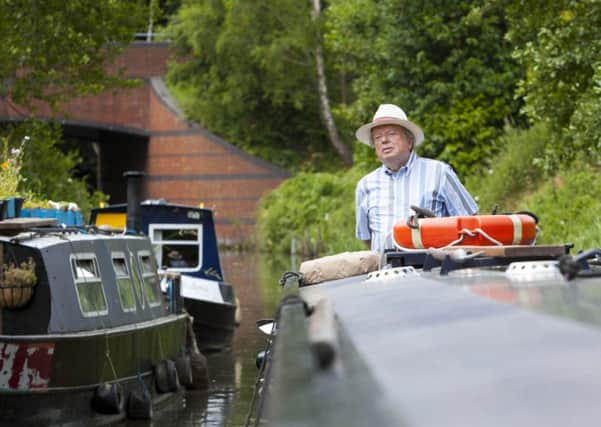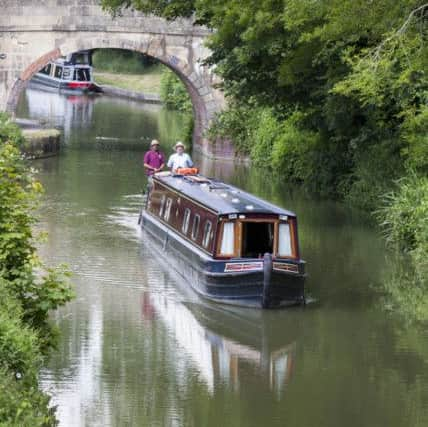John Sergeant and our love affair with the Pennine canals


John Sergeant has a theory about the peculiarly British love affair with canals.
While the network fulfils a need for adventure in the gentlest possible way, all 2,000 miles of the country’s waterways also symbolise something about our past and our historic ability to get things done.
Advertisement
Hide AdAdvertisement
Hide Ad“Britain’s canal network is a true national treasure,” says the presenter, whose latest series Barging Round Britain sees him travel some of the country’s most important canals. “They were forged in the fire of world-changing historic events and while yes, they are set against the backdrop of gorgeous scenery they were also responsible for this country becoming and staying an economic powerhouse.”


Canals changed the map of Britain. They were the motorways of the age. They made it easy to transport goods in bulk across the country and for the first time, towns could become home to new industries.
The series begins, perhaps appropriately with Sergeant navigating the 127 miles of the Leeds-Liverpool Canal whose opening ensured that Yorkshire became the epicentre of trade in the north.
By the end of the 18th century the number of mills had increased seven-fold and within the next 50 years the population trebled. However, the boom wasn’t sustainable without a decent transport network and the most forward-thinking of Yorkshire’s industrialists immediately saw the opportunities a canal which stretched to the Mersey docks could bring. However, not even their vision could prevent delays.
Advertisement
Hide AdAdvertisement
Hide Ad“The canal took 40 years to build, although it could have been completed much sooner, but money troubles got in the way and we had to see off Napoleon at Waterloo,” says Sergeant. “But these things happen and in 1816 this great route across the Pennines was up and running.”
Almost overnight, Yorkshire’s cities were transformed. With a secure route to bring raw materials in and send finished garments out, the canal saw the development of an industrial corridor running across the Pennines. Textile magnates like Titus Salt sited their giant factories beside the canal and suddenly goods being made in Yorkshire were destined for markets across the world.
“It really was an incredible feat of engineering and it stands as testament to human ingenuity,” adds Sergeant, who along his journey meets some of those who spent their working lives in the mills, retiring just as the sun was setting on much of the manufacturing industry.
“Take the Foulridge Tunnel. It was dug through such difficult rock that it would have been far too expensive to construct a towpath for a horse. So once inside the tunnel, men had to lie on their backs and use their legs against the walls to walk the boat through. And once you were through the tunnel you weren’t even halfway to Liverpool. It was a tough life. Days were long and the work arduous and yet people did it.”
Advertisement
Hide AdAdvertisement
Hide AdSergeant, who later in the series also takes in the Aire and Calder Navigation, negotiates the 44 locks over the Pennines which link the West Riding of Yorkshire to Liverpool and from there opening a gateway to the rest of the world, and the journey gave him enough time to ponder the relevance of the network today.
“It’s an astonishing thing to still have the canals here and we should celebrate the fact that we are still able to use them. Honestly, there’s no real equivalent. Had steam trains survived and we could travel from one end of the country to the other then that would probably conjure up the same feeling, but we can’t.
“Admittedly the barges may not be horsedrawn like they once were, but regardless, the sensation of travelling on them is pretty much exactly the same as when they were built and that really is something.
“Being able to spend my time discovering Britain’s waterways and call it work was a bit of dream project, to be honest, and I was thrilled to be asked.
Advertisement
Hide AdAdvertisement
Hide Ad“I am keen on boating and have been since I was a child. I go sailing every summer with my brother and while I don’t know why the whole ‘life on board’ routine is fascinating, it is. However, I didn’t know canals very well, other than making the odd little film about them, so for me this was really a change to explore.
“There’s a real element of mystery and adventure when you travel by canal and who doesn’t like a mystery? What I also found was a sense of real companionship with the people you are with and those you meet along the way.”
And if he has one piece of advice for those inspired to follow in his watery footsteps?
“Planning is the key thing. Choose your route carefully because you are only ever going to be moving at 4mph, so mistakes take a very long time to rectify. Decide how far you can go, what you want to see and how far you want to go, but most importantly take in your surroundings and enjoy.”
• Barging Around Britain begins on ITV on February 13 at 8pm.